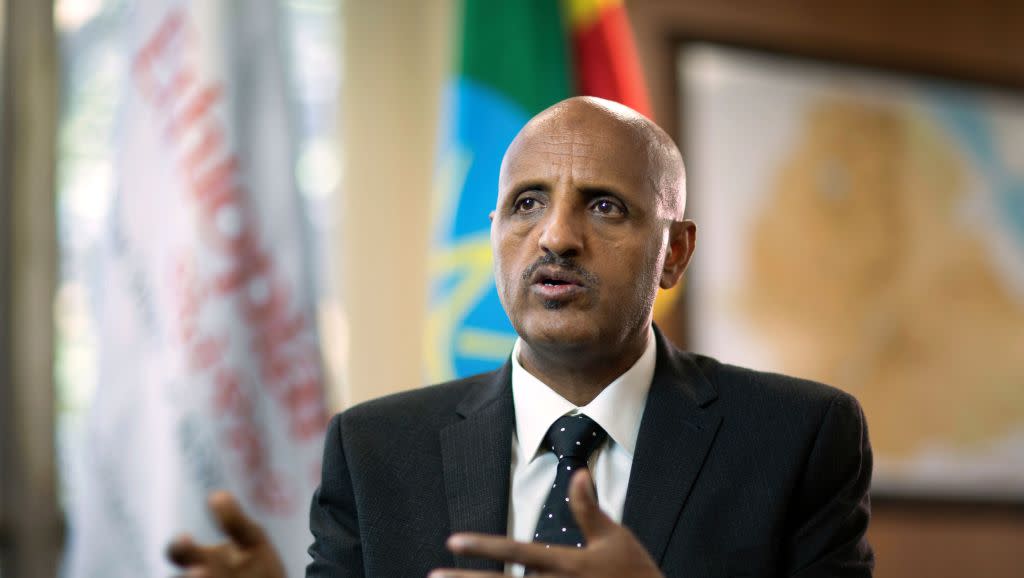Ethiopian Airlines says its relationship with Boeing will last “well into the future”

Ethiopian Airlines has said it has confidence in Boeing, a singular vote of confidence that comes as both companies face increasing questions following a deadly crash in early March.
In a statement today (March 25), CEO Tewolde GebreMariam said the company will work with the US manufacturer and other airlines to “make air travel even safer” and to “make the skies safer for the world.”
Boeing is facing scrutiny and government probes after two fatal crashes involving its 737 Max 8 model aircraft occurred within months of each other in Indonesia and Ethiopia, leading to their grounding worldwide. Although the causes of the crashes are yet to be determined, questions have swirled around the plane’s automated system designed to direct the nose downwards if it was in danger of stalling.
Transport officials in Addis Ababa have said there were “clear similarities” between the Ethiopian and Lion Air crashes in Indonesia. Both planes flew with erratic altitude changes and crashed minutes after takeoff while trying to return to the airport.
The Chicago-headquartered planemaker is the key supplier to Ethiopian, with the partnership between the two extending to the early 1960s. The ET 302 flight plane that crashed was less than five months old, and Tewolde said they took delivery of yet another 737 Boeing cargo planes of a different model less than a month ago.
Tewolde also extolled Ethiopian’s relationship with the US aviation industry, saying their earlier pilots, crew, and mechanics were employees of the now-defunct New York-based airline, TWA. Ethiopian Airlines was originally established after a visiting Ethiopian delegation requested American officials in 1945 to help establish a commercial airline for domestic air service.
“Let me be clear: Ethiopian Airlines believes in Boeing,” Tewolde said. “Despite the tragedy, Boeing and Ethiopian Airlines will continue to be linked well into the future.”

Ethiopian Airlines’ renewed pledge to Boeing comes as the state carrier itself fends off allegations that it sacrificed expansion and profit for safety. The carrier is Africa’s fastest-growing with hubs across the continent and a 113-strong fleet servicing 119 destinations worldwide.
A New York Times story last week reported that even though the airline had the 737 Max 8 simulator, the pilot on the ill-fated flight was yet to be trained on it. A Washington Post report also found 2015 complaints in the US Federal Aviation Administration database from pilots who accused the airline of failing to update manuals and for instituting a “fear-based” management style.
Ethiopian refuted both stories and even called on the Post to “remove the article, apologize and correct the facts.”
When the Boeing 737 Max 8 was first introduced, Boeing and the FAA agreed pilots who had flown a related earlier 737 model didn’t need additional simulator training, nor training specifically about the automated system known as MCAS. Pilots qualified to fly the 737-800 only received training that amounted to “an iPad lesson for an hour.” Pilot unions have said that since the Lion Air crash, they have received formal instruction on the feature.
Tewolde said in his statement their pilots “who fly the new model were trained on all appropriate simulators”—but still didn’t confirm whether the specific pilots on the doomed ET 302 trained on the simulator.
Boeing currently continues to face the bulk of criticism especially after revelations that it charged extra for safety features that it now says it would add as standard feature following the crashes. And despite the expression of confidence, there seems to be a chance of fissure between Ethiopian and Boeing as investigations continue.
In the aftermath of the Lion Air crash, “more should have been done from the Boeing side in terms of disclosure, in terms of coming up with strong procedures, stronger than what they gave us,” Tewolde told the Wall Street Journal today.
Sign up to the Quartz Africa Weekly Brief here for news and analysis on African business, tech and innovation in your inbox
Sign up for the Quartz Daily Brief, our free daily newsletter with the world’s most important and interesting news.
More stories from Quartz:
